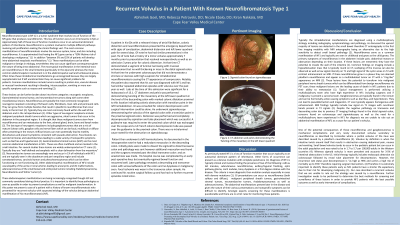Monday Poster Session
Category: Colon
P2039 - Recurrent Volvulus in Patient With Known Neurofibromatosis Type 1
Monday, October 28, 2024
10:30 AM - 4:00 PM ET
Location: Exhibit Hall E

Has Audio
- AG
Abhishek Goel, MD
Cape Fear Valley Health
Fayetteville, NC
Presenting Author(s)
Abhishek Goel, MD, Rebecca Petrovski, DO, Nicole Ebalo, DO, Kiran R. Nakkala, MD, MPH
Cape Fear Valley Health, Fayetteville, NC
Introduction: Neurofibromatosis type 1 (NF-1) is a neurocutaneous syndrome with characteristic tumors of the skin and the nervous system. Classically it presents as benign external soft tissue tumors but it is a multisystemic disorder that can involve other regions including the gastrointestinal tract. These abdominopelvic manifestations are being increasingly recognized though still not commonly considered during clinical practice. In this case, we have a patient presenting with recurrent volvulus likely secondary to gastrointestinal involvement from his neurofibromatosis.
Case Description/Methods: We are presenting a case of a 69 year old male, with history of NF-1, who presented with abdominal distension, pain and constipation for a few days but denied any chronic constipation. Computed tomography (CT) scan showed twisting of the mesentery at the left lower quadrant at level of descending colon with marked colonic dilatation proximal to this transition point. This was suggestive of sigmoid volvulus and was consistent with similar such episodes reported in the past. Prior CT scans consistently reported focal luminal narrowing of the distal sigmoid colon with associated mucosal enhancement but no associated significant wall thickening or mass. Previous colonoscopy was grossly normal with no stricture/stenosis or intraluminal mass seen with the gastroenterologist indicating possibility of intra-abdominal neurofibromatosis as cause of patient’s presentation and CT findings. Notably, patient also reported that his son, with diagnosed NF-1, has had similar repeated abdominal episodes over the past year as well. Sigmoidoscopy was performed during this admission with successful detorsion of sigmoid volvulus along with complete colonic decompression by aspiration.
Discussion: Neurofibromatosis has gastrointestinal manifestations in 10-20% of the patients with most of the tumors being asymptomatic and an incidental finding. However, the growth of these tumors can cause unanticipated symptoms and complications based on their anatomical location. This case shows an extremely uncommon presentation of recurrent volvulus in a patient with NF-1 with imaging findings suspicious of abdominal involvement and no other commonly known etiologies identified. Hence although rare, we would like to urge early consideration of abdominal neurofibromatosis manifestations as cause of acute or chronic abdominal symptoms in patients with known diagnosis of NF-1.
Disclosures:
Abhishek Goel, MD, Rebecca Petrovski, DO, Nicole Ebalo, DO, Kiran R. Nakkala, MD, MPH. P2039 - Recurrent Volvulus in Patient With Known Neurofibromatosis Type 1, ACG 2024 Annual Scientific Meeting Abstracts. Philadelphia, PA: American College of Gastroenterology.
Cape Fear Valley Health, Fayetteville, NC
Introduction: Neurofibromatosis type 1 (NF-1) is a neurocutaneous syndrome with characteristic tumors of the skin and the nervous system. Classically it presents as benign external soft tissue tumors but it is a multisystemic disorder that can involve other regions including the gastrointestinal tract. These abdominopelvic manifestations are being increasingly recognized though still not commonly considered during clinical practice. In this case, we have a patient presenting with recurrent volvulus likely secondary to gastrointestinal involvement from his neurofibromatosis.
Case Description/Methods: We are presenting a case of a 69 year old male, with history of NF-1, who presented with abdominal distension, pain and constipation for a few days but denied any chronic constipation. Computed tomography (CT) scan showed twisting of the mesentery at the left lower quadrant at level of descending colon with marked colonic dilatation proximal to this transition point. This was suggestive of sigmoid volvulus and was consistent with similar such episodes reported in the past. Prior CT scans consistently reported focal luminal narrowing of the distal sigmoid colon with associated mucosal enhancement but no associated significant wall thickening or mass. Previous colonoscopy was grossly normal with no stricture/stenosis or intraluminal mass seen with the gastroenterologist indicating possibility of intra-abdominal neurofibromatosis as cause of patient’s presentation and CT findings. Notably, patient also reported that his son, with diagnosed NF-1, has had similar repeated abdominal episodes over the past year as well. Sigmoidoscopy was performed during this admission with successful detorsion of sigmoid volvulus along with complete colonic decompression by aspiration.
Discussion: Neurofibromatosis has gastrointestinal manifestations in 10-20% of the patients with most of the tumors being asymptomatic and an incidental finding. However, the growth of these tumors can cause unanticipated symptoms and complications based on their anatomical location. This case shows an extremely uncommon presentation of recurrent volvulus in a patient with NF-1 with imaging findings suspicious of abdominal involvement and no other commonly known etiologies identified. Hence although rare, we would like to urge early consideration of abdominal neurofibromatosis manifestations as cause of acute or chronic abdominal symptoms in patients with known diagnosis of NF-1.
Disclosures:
Abhishek Goel indicated no relevant financial relationships.
Rebecca Petrovski indicated no relevant financial relationships.
Nicole Ebalo indicated no relevant financial relationships.
Kiran Nakkala indicated no relevant financial relationships.
Abhishek Goel, MD, Rebecca Petrovski, DO, Nicole Ebalo, DO, Kiran R. Nakkala, MD, MPH. P2039 - Recurrent Volvulus in Patient With Known Neurofibromatosis Type 1, ACG 2024 Annual Scientific Meeting Abstracts. Philadelphia, PA: American College of Gastroenterology.
